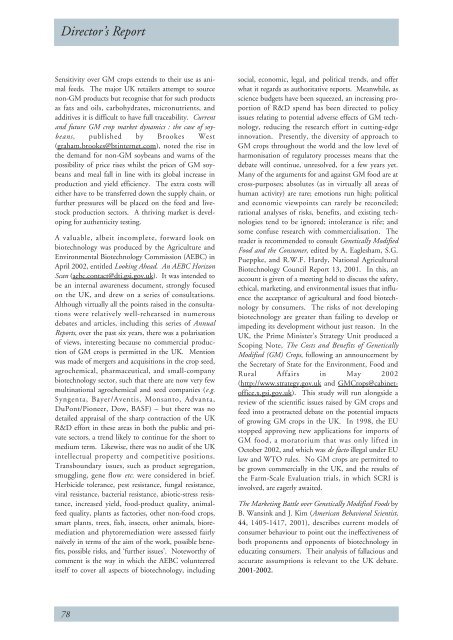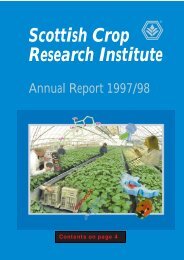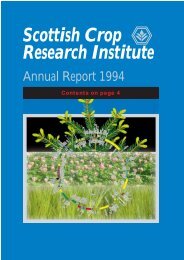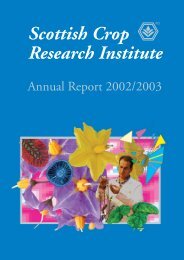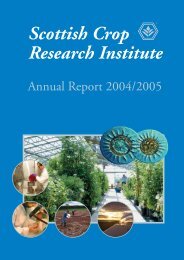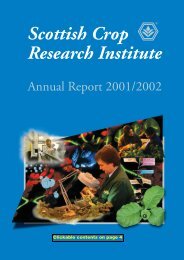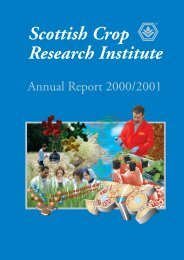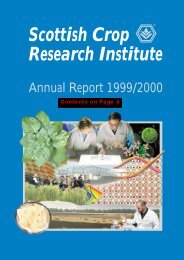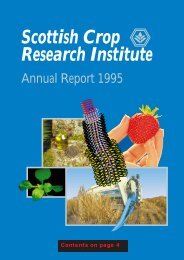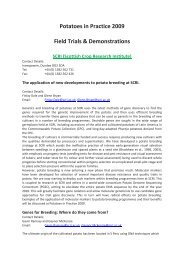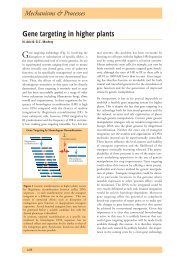SCRI Annual Report 2003/2004 - Scottish Crop Research Institute
SCRI Annual Report 2003/2004 - Scottish Crop Research Institute
SCRI Annual Report 2003/2004 - Scottish Crop Research Institute
Create successful ePaper yourself
Turn your PDF publications into a flip-book with our unique Google optimized e-Paper software.
Director’s <strong>Report</strong><br />
Sensitivity over GM crops extends to their use as animal<br />
feeds. The major UK retailers attempt to source<br />
non-GM products but recognise that for such products<br />
as fats and oils, carbohydrates, micronutrients, and<br />
additives it is difficult to have full traceability. Current<br />
and future GM crop market dynamics : the case of soybeans,<br />
published by Brookes West<br />
(graham.brookes@btinternet.com), noted the rise in<br />
the demand for non-GM soybeans and warns of the<br />
possibility of price rises whilst the prices of GM soybeans<br />
and meal fall in line with its global increase in<br />
production and yield efficiency. The extra costs will<br />
either have to be transferred down the supply chain, or<br />
further pressures will be placed on the feed and livestock<br />
production sectors. A thriving market is developing<br />
for authenticity testing.<br />
A valuable, albeit incomplete, forward look on<br />
biotechnology was produced by the Agriculture and<br />
Environmental Biotechnology Commission (AEBC) in<br />
April 2002, entitled Looking Ahead. An AEBC Horizon<br />
Scan (aebc.contact@dti.gsi.gov.uk). It was intended to<br />
be an internal awareness document, strongly focused<br />
on the UK, and drew on a series of consultations.<br />
Although virtually all the points raised in the consultations<br />
were relatively well-rehearsed in numerous<br />
debates and articles, including this series of <strong>Annual</strong><br />
<strong>Report</strong>s, over the past six years, there was a polarisation<br />
of views, interesting because no commercial production<br />
of GM crops is permitted in the UK. Mention<br />
was made of mergers and acquisitions in the crop seed,<br />
agrochemical, pharmaceutical, and small-company<br />
biotechnology sector, such that there are now very few<br />
multinational agrochemical and seed companies (e.g.<br />
Syngenta, Bayer/Aventis, Monsanto, Advanta,<br />
DuPont/Pioneer, Dow, BASF) – but there was no<br />
detailed appraisal of the sharp contraction of the UK<br />
R&D effort in these areas in both the public and private<br />
sectors, a trend likely to continue for the short to<br />
medium term. Likewise, there was no audit of the UK<br />
intellectual property and competitive positions.<br />
Transboundary issues, such as product segregation,<br />
smuggling, gene flow etc. were considered in brief.<br />
Herbicide tolerance, pest resistance, fungal resistance,<br />
viral resistance, bacterial resistance, abiotic-stress resistance,<br />
increased yield, food-product quality, animalfeed<br />
quality, plants as factories, other non-food crops,<br />
smart plants, trees, fish, insects, other animals, bioremediation<br />
and phytoremediation were assessed fairly<br />
naïvely in terms of the aim of the work, possible benefits,<br />
possible risks, and ‘further issues’. Noteworthy of<br />
comment is the way in which the AEBC volunteered<br />
itself to cover all aspects of biotechnology, including<br />
social, economic, legal, and political trends, and offer<br />
what it regards as authoritative reports. Meanwhile, as<br />
science budgets have been squeezed, an increasing proportion<br />
of R&D spend has been directed to policy<br />
issues relating to potential adverse effects of GM technology,<br />
reducing the research effort in cutting-edge<br />
innovation. Presently, the diversity of approach to<br />
GM crops throughout the world and the low level of<br />
harmonisation of regulatory processes means that the<br />
debate will continue, unresolved, for a few years yet.<br />
Many of the arguments for and against GM food are at<br />
cross-purposes; absolutes (as in virtually all areas of<br />
human activity) are rare; emotions run high; political<br />
and economic viewpoints can rarely be reconciled;<br />
rational analyses of risks, benefits, and existing technologies<br />
tend to be ignored; intolerance is rife; and<br />
some confuse research with commercialisation. The<br />
reader is recommended to consult Genetically Modified<br />
Food and the Consumer, edited by A. Eaglesham, S.G.<br />
Pueppke, and R.W.F. Hardy, National Agricultural<br />
Biotechnology Council <strong>Report</strong> 13, 2001. In this, an<br />
account is given of a meeting held to discuss the safety,<br />
ethical, marketing, and environmental issues that influence<br />
the acceptance of agricultural and food biotechnology<br />
by consumers. The risks of not developing<br />
biotechnology are greater than failing to develop or<br />
impeding its development without just reason. In the<br />
UK, the Prime Minister’s Strategy Unit produced a<br />
Scoping Note, The Costs and Benefits of Genetically<br />
Modified (GM) <strong>Crop</strong>s, following an announcement by<br />
the Secretary of State for the Environment, Food and<br />
Rural Affairs in May 2002<br />
(http://www.strategy.gov.uk and GM<strong>Crop</strong>s@cabinetoffice.x.gsi.gov.uk).<br />
This study will run alongside a<br />
review of the scientific issues raised by GM crops and<br />
feed into a protracted debate on the potential impacts<br />
of growing GM crops in the UK. In 1998, the EU<br />
stopped approving new applications for imports of<br />
GM food, a moratorium that was only lifted in<br />
October 2002, and which was de facto illegal under EU<br />
law and WTO rules. No GM crops are permitted to<br />
be grown commercially in the UK, and the results of<br />
the Farm-Scale Evaluation trials, in which <strong>SCRI</strong> is<br />
involved, are eagerly awaited.<br />
The Marketing Battle over Genetically Modified Foods by<br />
B. Wansink and J. Kim (American Behavioral Scientist,<br />
44, 1405-1417, 2001), describes current models of<br />
consumer behaviour to point out the ineffectiveness of<br />
both proponents and opponents of biotechnology in<br />
educating consumers. Their analysis of fallacious and<br />
accurate assumptions is relevant to the UK debate.<br />
2001-2002.<br />
78


